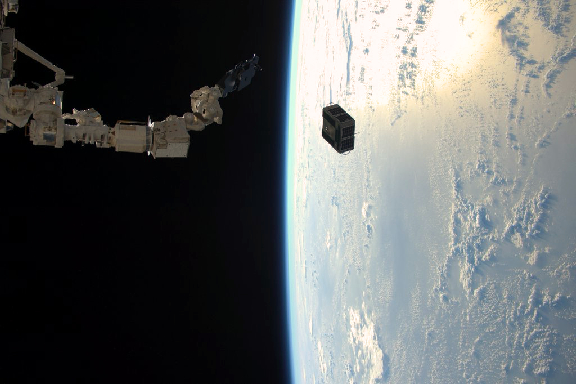[Satnews] MEI Technologies, Inc. (MEIT) recently celebrated the successful deployment of two satellites—built by two Texas universities—from the International Space Station.

Pictured is the LONESTAR satellite just after the robotic arm in Japan's Kibo laboratory deployed it from the Space Station on the morning of January 29.
Photo is credit of ESA/NASA.
This mission, named the Low Earth Orbiting Navigation Experiment for Spacecraft Testing Autonomous Rendezvous and Docking (LONESTAR) investigation, is comprised of Texas A&M University’s AggieSat4 satellite and University of Texas’ Bevo-2 satellite. MEIT serves as the Universities’ mentor under the NASA JSC Engineering, Technology, and Science (JETS) contract managed by Jacobs Technology.
The purpose of the LONESTAR mission—which is the second of four missions of the LONESTAR investigation project—is for the two satellites to talk, take pictures and track each other while moving closely together. Ultimately, the LONESTAR project will demonstrate the capability of satellites to autonomously rendezvous and dock with each other, saving man hours and eliminating human error. MEIT’s mentorship role on the LONESTAR project is to provide guidance and oversee the design and build of the satellites, as well as take the project through NASA testing, integration and safety processes and requirements.
The MEIT engineers who support this university program work for MEIT on the Department of Defense (DoD) Human Exploration Payloads (DHEP) contract. On this prime contract for the company, MEIT supports the U.S. Air Force through payload integration and integrating DoD experiments. The same expertise also support MEIT’s spin-off company, Alpha Space, serving the materials science community with on-orbit, real-time pure materials science research.
Prior to this mission, MEIT mentored LONESTAR’s first mission—named DRAGONSat—successfully launching and deploying satellites AggieSat2 and Bevo-1 on the Shuttle.
“We are proud and excited to collaborate with NASA and Texas engineering students on the LONESTAR project,” said MEIT engineer and lead mentor Zane Singleton. “The success of this project will allow for exciting applications, benefiting NASA, the Military, and the commercial space industry.”


